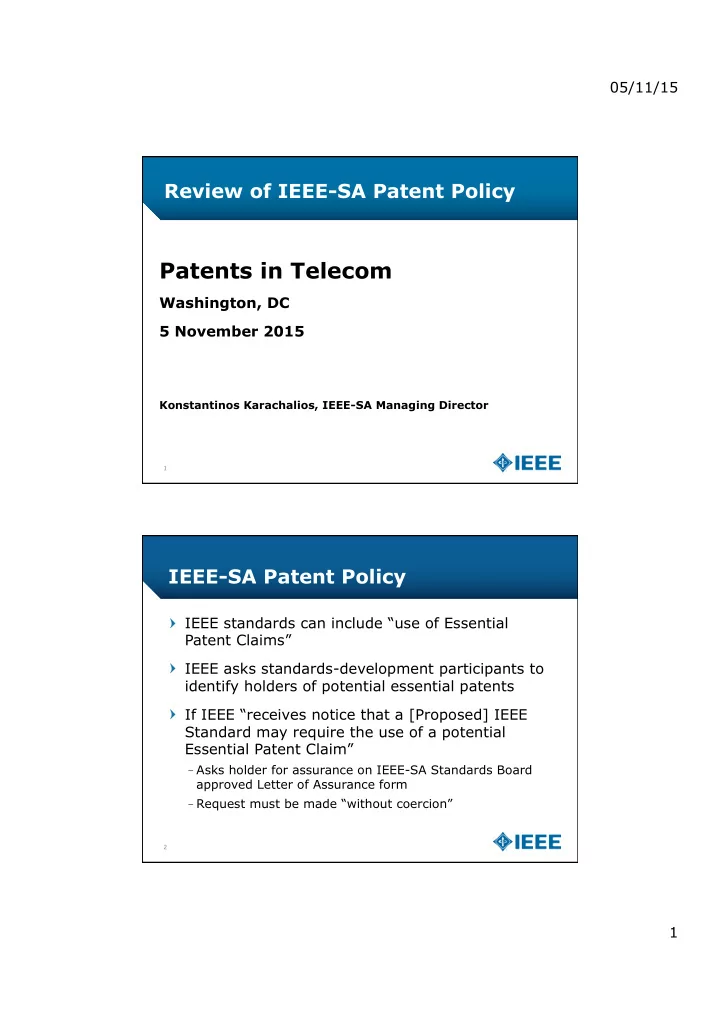

05/11/15 Review of IEEE-SA Patent Policy Patents in Telecom Washington, DC 5 November 2015 Konstantinos Karachalios, IEEE-SA Managing Director 1 IEEE-SA Patent Policy IEEE standards can include “use of Essential Patent Claims” IEEE asks standards-development participants to identify holders of potential essential patents If IEEE “receives notice that a [Proposed] IEEE Standard may require the use of a potential Essential Patent Claim” – Asks holder for assurance on IEEE-SA Standards Board approved Letter of Assurance form – Request must be made “without coercion” 2 1
05/11/15 What IEEE requests IEEE-SA asks for licensing assurance – “a license for Essential Patent Claims,” to be made available to – “an unrestricted number of Applicants” – “on a worldwide basis” – “without compensation or under Reasonable Rates, with other reasonable terms and conditions” – “that are demonstrably free of any unfair discrimination” – for “any Compliant Implementation that practices the Essential Patent Claim for use in conforming with the IEEE Standard” 3 Patent Holder’s choices for response Deny awareness of Essential Patent Claim Submit LOA committing to – License Essential Patent Claim on royalty-free terms, or – License Essential Patent Claim with reasonable royalty, or – Refrain from enforcing Essential Patent Claim Submit “negative LOA,” declining to give any assurance as to licensing intentions Not respond 4 2
05/11/15 Important background points Submission of LOAs is voluntary – Assurances apply only to Essential Patent Claims Participants in IEEE standards-development are not required to provide licensing assurance as a condition of participation – IEEE will request licensing assurance and, if not granted, working groups consider alternative technologies 5 Important background points, cont’d IEEE does not prevent patent holders from seeking royalties – Letter of Assurance expressly includes option for patent holder to seek reasonable royalty IEEE does not set reasonable royalties – Policy provides definition and identifies non-exclusive list of recommended considerations – Actual royalty rate is still left to negotiations between parties (or litigation or arbitration, if necessary) 6 3
05/11/15 Important background points, cont’d IEEE does not prohibit seeking of Prohibitive Orders (injunctions/exclusion orders) No duty to conduct patent search IEEE does not determine validity, essentiality, or infringement 7 Key points in 2015 update Patent policy now provides some meaning: – “reasonable” rate Patent policy provides more clarity: – Nondiscrimination between and among implementers (through definition of “Compliant Implementation”) – Availability of Prohibitive Orders – Permissible demands for reciprocal license 8 4
05/11/15 “Reasonable Rate” Policy provides (i) a definition of “Reasonable Rate,” and (ii) three recommended factors in determining a Reasonable Rate Definition: – “appropriate compensation to the patent holder for the practice of an Essential Patent Claim excluding the value, if any, resulting from the inclusion of that Essential Patent Claim’s technology in the IEEE Standard” – Patent holder is compensated, but not for value conferred by inclusion in standard 9 Recommended factors Value contributed “ to the value of the relevant functionality of the smallest saleable Compliant Implementation that practices the Essential Patent Claim ” Value contributed “ in light of the value contributed by all Essential Patent Claims for the same IEEE Standard practiced in that [smallest saleable] Compliant Implementation ” “ Existing licenses ” that “ were not obtained under the explicit or implicit threat of a Prohibitive Order ” and “ otherwise sufficiently comparable ” circumstances 10 5
05/11/15 Nondiscrimination Policy provides a definition of “Compliant Implementation” – “any product (e.g., component, sub-assembly, or end- product) or service that conforms to any mandatory or optional portion of a normative clause of an IEEE Standard” Any maker of a Compliant Implementation is entitled to benefit of LOA, but only “for use in conforming with the IEEE Standard” – Parties free to negotiate license for other uses 11 Prohibitive Orders Implementer and patent holder “should engage in good faith negotiations (if sought by either party) without unreasonable delay” Policy update describes circumstances where patent holder voluntarily agrees it will not seek Prohibitive Order 12 6
05/11/15 Prohibitive Orders, cont’d Patent holder not precluded from seeking Prohibitive Order where implementer – “fails to participate in” or “fails . . . to comply with the outcome of” an adjudication, including an affirming first-level appellate review . . .” § Court or courts must have the authority to resolve all patent-related issues Patent holder not precluded from conditionally requesting Prohibitive Order where failure to do so would permanently waives its right 13 Reciprocal Licensing Patent holder can require applicant to grant a license to the patent holder for applicant’s own Essential Patent Claims for the same IEEE Standard Submitter cannot both demand reciprocal licenses and exclude patents held by Submitter’s affiliate 14 7
05/11/15 Additional resources IEEE-SA patent materials: http://standards.ieee.org/about/sasb/patcom/materials.html IEEE's request for a Business Review Letter: http://www.justice.gov/atr/public/busreview/request-letters/ 311483.pdf Business Review Letter: http://www.justice.gov/atr/public/busreview/311470.htm 2015 Resolutions from the IEEE-SA Standards Board: http://standards.ieee.org/about/sasb/resolutions.html 15 8
Recommend
More recommend